- Python Basic Programs
- Python Program Examples
- Python Print Hello World
- Python Get Input from User
- Python Add Two Numbers
- Add Subtract Multiply Divide
- Python Check Even or Odd
- Python Check Prime or Not
- Python Check Alphabet or Not
- Python Check Vowel or Not
- Python Check Leap Year or Not
- Check Reverse equal Original
- Check Positive Negative Zero
- Python Check Armstrong or Not
- Python Check Palindrome or Not
- Python Check Perfect Number
- Python Find Reverse of Number
- Python Count Digits in Number
- Python Add Digits of Number
- Sum of First and Last Digits
- Python Product of Mid Digits
- Sum of Squares of Digits
- Interchange Digits of Number
- Python Sum of n Numbers
- Python Print ASCII Values
- Python Swap Two Numbers
- Python Swap Two Variables
- Python Fahrenheit to Celsius
- Python Celsius to Fahrenheit
- Python Display Calendar
- Python Days into Years, Weeks
- Find Largest of Two Number
- Find Largest of Three Number
- Python Print Fibonacci Series
- Generate Armstrong Numbers
- Python Make Simple Calculator
- Python Add Binary Numbers
- Binary Number Multiplication
- Python Mathematical Programs
- Find Sum of Natural Numbers
- Find Average of n Numbers
- Python Print Multiplication Table
- Print Table using Recursion
- Python Find Average Percentage
- Python Find Grade of Student
- Find Square Root of Number
- Python Print Prime Numbers
- Find Numbers Divisible by
- Python Find Factors of Number
- Python Find Factorial of a Number
- Python Find HCF & LCM
- Python Kilometres to Miles
- Python Find Area of Square
- Python Find Area of Rectangle
- Python Find Area of Triangle
- Python Find Area of Circle
- Python Find Perimeter of Square
- Find Perimeter of Rectangle
- Python Find Perimeter of Triangle
- Find Circumference of Circle
- Python Simple Interest
- Python Solve Quadratic Equation
- Python Different Set of Operations
- Python Display Powers of 2
- Python Find nCr & nPr
- Python Pattern Programs
- Python Print Pattern Programs
- Python Print Diamond Pattern
- Python Print Floyd's Triangle
- Python Print Pascal's Triangle
- Python List Programs
- Python Count Even/Odd in List
- Python Positive/Negative in List
- Python Even Numbers in List
- Python Odd Numbers in List
- Python Sum of Elements in List
- Sum of Odd/Even Numbers
- Python Element at Even Position
- Python Element at Odd Position
- Python Search Element in List
- Python Largest Number in List
- Python Smallest Number in List
- Python Second Largest in List
- Python Second Smallest in List
- Python Insert Element in List
- Python Delete Element from List
- Python Multiply Numbers in List
- Swap Two Elements in List
- Python 1D Array Program
- Python Linear Search
- Python Binary Search
- Python Insertion Sort
- Python Bubble Sort
- Python Selection Sort
- Remove Duplicates from List
- Python Reverse a List
- Python Merge Two List
- Python Copy a List
- Python Conversion Programs
- Python Decimal to Binary
- Python Decimal to Octal
- Python Decimal to Hexadecimal
- Python Binary to Decimal
- Python Binary to Octal
- Python Binary to Hexadecimal
- Python Octal to Decimal
- Python Octal to Binary
- Python Octal to Hexadecimal
- Python Hexadecimal to Decimal
- Python Hexadecimal to Binary
- Python Hexadecimal to Octal
- Python Matrix Programs
- Python Add Two Matrices
- Python Subtract Two Matrices
- Python Transpose Matrix
- Python Multiply Matrices
- Python String Programs
- Python Print String
- Python Find Length of String
- Python Compare Two Strings
- Python Copy String
- Python Concatenate String
- Python Reverse a String
- Python Swap Two Strings
- Python Uppercase to Lowercase
- Python Lowercase to Uppercase
- Python Check Substring in String
- Python Count Character in String
- Count Repeated Characters
- Python Count Word in Sentence
- Python Count Each Vowels
- Python Capitalize Character
- Python Capitalize Word in String
- Python Smallest/Largest Word
- Remove Spaces from String
- Remove Duplicate Character
- Remove Vowels from String
- Remove Punctuation from String
- Python Remove Word in String
- Python Remove Duplicate Words
- WhiteSpace to Hyphens
- Replace Vowels with Character
- Replace Character in String
- Python Sort String in Alphabetical
- Sort Word in Alphabetical Order
- Extract Number from String
- Python Check Anagram Strings
- Python File Programs
- Python Read a File
- Python Write to File
- Python Append Text to File
- Python Copy Files
- Python Merge Two Files
- Python Counts Characters in File
- Python Count Words in File
- Python File Content in Reverse
- Python Lines Contains String
- Python Delete Line from File
- Python Capitalize Word in File
- Python Replace Text in File
- Replace Specific Line in File
- Python Find Size of File
- Python List Files in Directory
- Python Delete Files
- Python Misc Programs
- Python Reverse a Tuple
- Python Merge Two Dictionary
- Python bytes to String
- Python bytearray to String
- Generate Random Numbers
- Python Print Address of Variable
- Python Print Date and Time
- Python Get IP Address
- Python Shutdown/Restart PC
- Python Tutorial
- Python Tutorial
Python Program to Convert Binary to Octal
In this article, we've created some programs in Python, to convert any binary number entered by user at run-time to its equivalent octal value. Here are the list of programs:
- Binary to Octal with User-defined Code
- Binary to Octal using int() and oct() Methods
- Shortest Python Code for Binary to Octal Conversion
Note - Before starting these programs, if you're not aware about steps used for the conversion, then refer to Binary to Octal Conversion Methods, Steps, Formula to get every required things.
Binary to Octal with User-defined Code
To convert binary to octal number in Python, you have to ask from user to enter a number in binary number system to convert that number into octal number system as shown in the program given below.
The question is, write a Python program to convert binary to octal using while loop. Here is its answer:
print("Enter the Binary Number: ") binarynum = int(input()) octaldigit = 0 octalnum = [] i = 0 mul = 1 chk = 1 while binarynum!=0: rem = binarynum % 10 octaldigit = octaldigit + (rem * mul) if chk%3==0: octalnum.insert(i, octaldigit) mul = 1 octaldigit = 0 chk = 1 i = i+1 else: mul = mul*2 chk = chk+1 binarynum = int(binarynum / 10) if chk!=1: octalnum.insert(i, octaldigit) print("\nEquivalent Octal Value = ", end="") while i>=0: print(str(octalnum[i]), end="") i = i-1 print()
Here is its initial output:
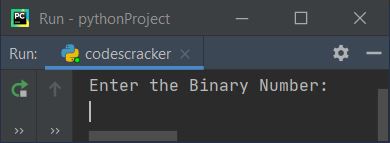
Now supply any binary number as input say 11101 and press ENTER key to convert it into
its equivalent octal value, then print the octal value on output as shown in the snapshot given below:
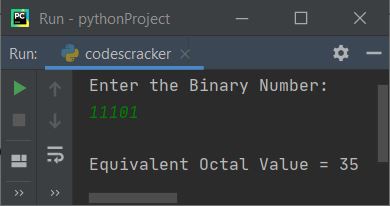
The insert() method is used to insert an element to the list. That is, the following statement:
octalnum.insert(i, octaldigit)
states that the value of octaldigit gets initialized to octalnum[i].
The dry run of above program with user input 11101 goes like:
- Initial values, binarynum=11101 (entered by user), octaldigit=0, i=0, mul=1, chk=1
- The condition (of while loop) binarynum!=0 or 11101!=0 evaluates to be true, therefore program flow goes inside the loop
- Inside the loop, the first statement, that is
rem = binarynum % 10
gets executed - binarynum%10 or 11101%10 or 1 (last digit of 11101) gets initialized to rem. So rem=1
- octaldigit + (rem*mul) or 0 + (1*1) or 1 gets initialized to octaldigit. So octaldigit=1
- Now the condition (of if block) chk%3==0 or 1%3==0 evaluates to be false, therefore program does not goes to its body, rather it goes to its else's counterpart and mul*2 or 1*2 or 2 gets initialized to mul. So mul=2
- chk+1 or 1+1 or 2 gets initialized to chk. So chk=2
- int(binarynum/10) or int(11101/10) or 1110 gets initialized to binarynum. So binarynum=1110
- The condition of while loop again gets evaluated with new value of binarynum
- That is, the condition binarynum!=0 or 1110!=0 evaluates to be true, therefore program flow again goes inside the loop. This process continues until the condition evaluates to be false
- In this way, the equivalent octal value of value stored in binarynum gets stored in octalnum list after exiting from the loop
The following condition:
if chk%3==0:
is applied to check for three-three pair of binary digits. And the following block of code:
if chk!=1: octalnum.insert(i, octaldigit)
is used to insert the value of octaldigit to octalnum[i], only if the value of chk is not equal to 1. The value of chk does not equal to 1 after exiting from the while loop indicates that the program flow does not goes inside the if's body before exiting from the loop.
Now print the value of octalnum list one by one starting from its last index. The end= is used to skip printing of an automatic newline using print()
Modified Version of Previous Program
This is the modified version of previous program. This program uses string instead of list, which is a better way in Python to convert any binary number to its equivalent octal value.
print("Enter the Binary Number: ", end="") bnum = int(input()) odig = 0 mul = chk = 1 onum = "" while bnum!=0: rem = bnum % 10 odig = odig + (rem * mul) if chk%3==0: onum = onum + str(odig) mul = chk = 1 odig = 0 else: mul = mul*2 chk = chk+1 bnum = int(bnum / 10) if chk!=1: onum = onum + str(odig) print("\nEquivalent Octal Value = ", onum[::-1])
Here is its sample run with user input, 11000111011 as binary number:
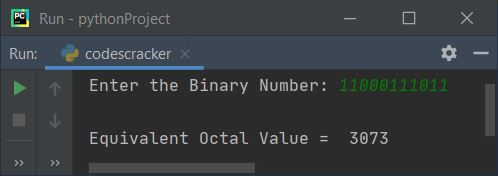
Note - The str() method is used to convert any type of value to a string type value.
Binary to Octal using int() and oct()
This program uses int() and oct() methods to convert binary to octal. Using input() to receive any input from user, treats the input as a string type value by default.
Therefore using int() with 2 as its second argument, converts the string to an integer type value with base two, that is, the input gets converted into a binary number. And oct() converts the value of onum to its equivalent octal value.
print("Enter a Binary Number: ", end="") bnum = input() onum = int(bnum, 2) onum = oct(onum) print("\nEquivalent Octal Value = ", onum)
Here is its sample run with user input, 10111:
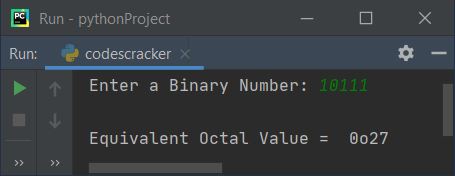
Note - To print only 27, that is, if you want to skip first two characters from octal number, then replace the following statement:
print("\nEquivalent Octal Value = ", onum)
with the statement given below:
print("\nEquivalent Octal Value = ", onum[2:])
Now the output with same user input looks like:
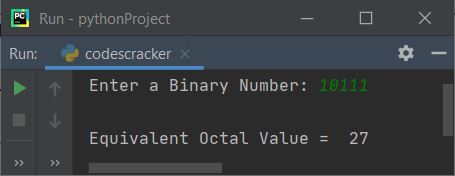
Shortest Python Code for Binary to Octal Conversion
This is the shortest Python code to convert binary to octal. [2:] is used to print elements of bnum starting from its second index.
bnum = input() print(oct(int(bnum, 2))[2:])
Here is its sample run with user input, 1100110:
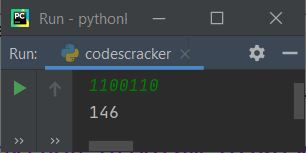
Same Program in Other Languages
« Previous Program Next Program »